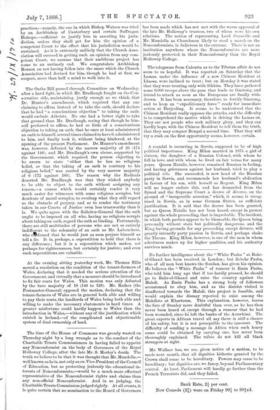The Oaths Bill passed through Committee on Wednesday, after a
hard fight, in which Mr. Bradlaugh fought on the Con- servative side, maintaining, justly enough as we think, that Dr. Hunter's amendment, which required that any one claiming to affirm instead of to take the oath, should declare that he had "a conscientious objection" to taking the oath, would exclude Atheists. No one had a better right to take that ground than Mr. Bradlaugh, seeing that though he him- self preferred to affirm, he had so little of a conscientious 'objection to taking an oath, that he once at least administered an oath to himself, several times claimed to have it administered to him, and finally took it, without being hindered, at the opening of the present Parliament. Dr. Hunter's amendment was, however, defeated by the narrow majority of 26 (174 against 148), and Mr. Bradlaugh's own clause, supported by the Government, which required the person objecting to be sworn to state "either that he has no religious belief, or that the taking of an oath is contrary to his religious belief," was carried by the very narrow majority of 6 (172 against 166). The reason why the Radicals deserted Mr. Bradlaugh was that they wished anybody to be able to object to the oath without assigning any reason,—a course which would certainly render it very much easier for witnesses with some religious scruples, but destitute of moral scruples, to overleap what they still regard as the obstacle of perjury, and so to render the testimony taken in our Courts of Justice even less trustworthy than it is. We quite agree with the Solicitor-General that the oath ought to be imposed on all who, having no religious scruple about taking an oath, regard the oath as binding. Fortunately, there are still multitudes of persons who are not so entirely indifferent to the solemnity of an oath as Mr. Labouchere, who clidessed that he would just as soon perjure himself as tell a lie. It is, perhaps, a superstition to hold that there is any difference ; but it is a superstition which makes, not perhaps for righteousness, but certainly for justice ; and even such superstitions are valuable.


































 Previous page
Previous page